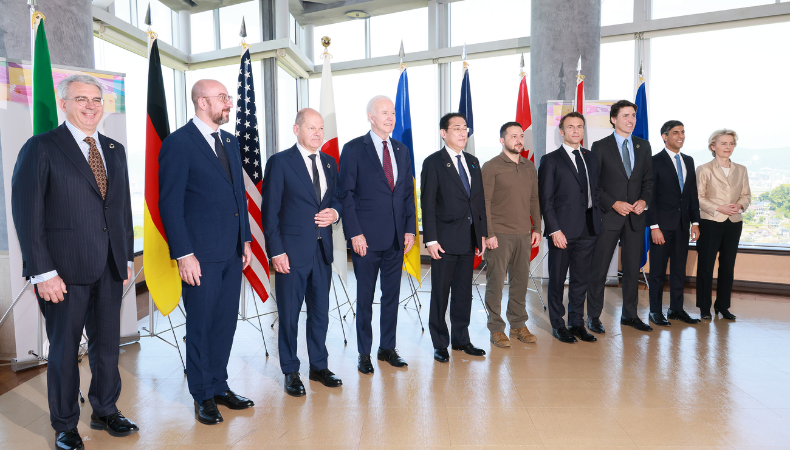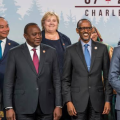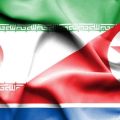G7 Summit Opens with Deal to Support Ukraine Using Frozen Russian Assets

Historic Agreement to Back Ukraine
The Group of Seven (G7) summit embarked upon a significant development: a consensus on a U.S. proposal to support a $50 billion loan for Ukraine using frozen Russian assets as collateral. This move marks a robust display of solidarity with Kyiv amid the ongoing conflict with Russia, as European politics undergo significant shifts towards the right.
A Symbolic Welcome and Global Dialogue
Hosting the summit at a luxurious resort in southern Italy, Prime Minister Giorgia Meloni emphasized the importance of dialogue with the global south and unity among nations. She drew a parallel between the ancient olive trees of the Puglia region and the G7, embodying deep roots and a forward looking approach.
Papal influence and Broader Agendas
Pope Francis will make history as the first Pope to address a G7 summit, he will be speaking on the promises and Perils of artificial intelligence and renewing calls for peaceful resolutions to conflicts, which includes the Israel Hamas conflict in Gaza and the war in Ukraine. His speech is anticipated to add a layer of moral authority to the proceedings.
Prominent Leaders and Strategic Guests
The guest list for the summit includes luminaries such as President of Ukraine Volodymyr Zelenskyy, Brazilian President Luiz Inacio Lula da Silva, Indian Prime Minister Narendra Modi and Turkish President Recep Tayyip Erdogan. Several African leaders have also been invited, reflecting Italy’s focus on development and migration issues.
Frozen Russian Assets: Financial Support for Ukraine
The U.S. proposal involves a $50 billion loan to Ukraine, using profits from frozen central bank assets from Russia as collateral. Although a political decision has been made, the legal and technical specifics are still under discussion. The quandary of this mechanism lies in the potential future unfreezing of these assets, which would mandate a burden sharing arrangement among participating nations.
U.K. Prime Minister Rishi Sunak also announced nonmilitary aid worth up to 242 million pounds for Ukraine in addition to this deal. The U.S. also reinforced its outlook with expanded sanctions targeting Chinese companies aiding Russia’s military efforts.
Europe’s Political Shifts and Meloni’s Influence
Bolstered by strong domestic and European electoral performances, Prime Minister Meloni enters the summit. Traditionally known for political instability, Italy now emerges as a stable power within the EU. In contrast, leaders in France and Germany face challenges from rising far right movements.
Meloni’s strengthened position allows her to mold and influence the summit’s agenda significantly, especially on development and migration issues. Discussion on sensitive issues like access to abortion are also underway, showcasing diverging views among G7 members.
Pope Francis on Artificial Intelligence
Pope Francis will address the ethical development and use of artificial intelligence, underscoring the threats and potential. He accentuates the risks AI poses, especially in the armaments sector and its implications for the vulnerable and poor. His call for an international treaty on AI ethics will be a crucial point of discussion.
Keep On Reading
The Summit Venue
The G7 summit is held at Borgo Egnazia, a luxury resort designed to mimic a medieval Puglian hamlet. While the venue offers five star accomodations for the guests, security personnel face less favorable conditions on a decommissioned cruise ship, which has been criticized for poor hygiene.
Protests and Activism
As with previous G7 summits, the event has attracted anti globalization, anti war and climate activists. Demonstrations are taking place around the venue, with a group hosting a “dinner for the poor” to protest the prestige of the G7 leaders on global decisions.









